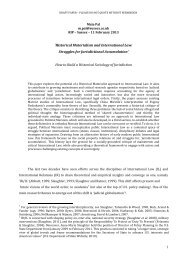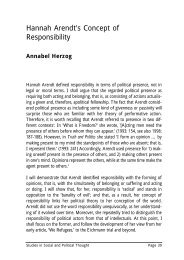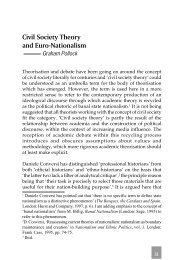rural livelihoods in the global south (f8017s) - University of Sussex
rural livelihoods in the global south (f8017s) - University of Sussex
rural livelihoods in the global south (f8017s) - University of Sussex
Create successful ePaper yourself
Turn your PDF publications into a flip-book with our unique Google optimized e-Paper software.
Supplementary material (text and/or graphics) derived from newspapers,<br />
magaz<strong>in</strong>es, journals, websites, o<strong>the</strong>r lectures, etc.<br />
Commentaries on television programs, movies, novels, poetry etc. that say<br />
someth<strong>in</strong>g to <strong>the</strong> module and your ideas about <strong>rural</strong> <strong>livelihoods</strong> <strong>in</strong> <strong>the</strong> <strong>global</strong> <strong>south</strong>.<br />
A record <strong>of</strong> how your ideas have changed/been changed dur<strong>in</strong>g <strong>the</strong> term.<br />
As a conclusion, to reflect back on those aspects <strong>of</strong> <strong>the</strong> Term which you found most<br />
<strong>in</strong>terest<strong>in</strong>g, and why, if at all, your views have changed.<br />
The structure, style <strong>of</strong> presentation, length, amount <strong>of</strong> illustrative material and so on, is<br />
yours to decide. Many students f<strong>in</strong>d it useful to keep a computer diary but <strong>the</strong> Learn<strong>in</strong>g<br />
Diary can also be (neatly) hand-written <strong>in</strong> part or <strong>in</strong> full. This is quite a different form <strong>of</strong><br />
writ<strong>in</strong>g and expression from much <strong>of</strong> <strong>the</strong> more formal essay style <strong>of</strong> work you have<br />
previously undertaken.<br />
The Purpose <strong>of</strong> <strong>the</strong> Learn<strong>in</strong>g Diary<br />
The Learn<strong>in</strong>g Diary is specifically designed to encourage reflexivity upon your own<br />
learn<strong>in</strong>g and to facilitate a broad perspective dur<strong>in</strong>g <strong>the</strong> term. It is a cont<strong>in</strong>uous<br />
engagement. You will not be able to concentrate on a few selected topics, as with essay<br />
writ<strong>in</strong>g, but should feel it important to create l<strong>in</strong>kages between <strong>the</strong> different elements <strong>of</strong> <strong>the</strong><br />
module and to th<strong>in</strong>k carefully about <strong>the</strong> underly<strong>in</strong>g mean<strong>in</strong>gs, connections and<br />
relationships between <strong>the</strong> texts with which you are deal<strong>in</strong>g, ra<strong>the</strong>r than to memorise <strong>the</strong><br />
surface features only, or to take a strategic approach to selective read<strong>in</strong>g. All <strong>the</strong> elements<br />
<strong>of</strong> <strong>the</strong> Term’s work will <strong>the</strong>refore count <strong>in</strong> your Diary. It should be developmental and<br />
demonstrate a cumulative understand<strong>in</strong>g <strong>of</strong> <strong>the</strong> module’s material as we go along.<br />
In <strong>the</strong>se ways, <strong>the</strong> Learn<strong>in</strong>g Diary is a formative exercise. Not only will you benefit from a<br />
more reflexive approach to your studies, you will also receive feedback and comments<br />
from <strong>the</strong> tutors that should benefit you greatly <strong>in</strong> develop<strong>in</strong>g a more strategic approach to<br />
your learn<strong>in</strong>g <strong>in</strong> o<strong>the</strong>r modules and assessments. The style <strong>of</strong> writ<strong>in</strong>g will be different: it is<br />
not a ‘state <strong>of</strong> <strong>the</strong> art’ presentation like an essay which demonstrates your best possible<br />
understand<strong>in</strong>g <strong>of</strong> an issue, ra<strong>the</strong>r, it can be a much more provisional, work<strong>in</strong>g document,<br />
with unresolved queries, first thoughts and frustrations all <strong>in</strong>cluded, which (hopefully) may<br />
be resolved at a later stage. In a more <strong>in</strong>formal sense, <strong>the</strong> word ‘I’ or ‘we’ might be used<br />
more liberally than you might <strong>in</strong> a formal essay (for certa<strong>in</strong> tutors). So, an example, <strong>the</strong><br />
beg<strong>in</strong>n<strong>in</strong>g <strong>of</strong> a weekly entry might look someth<strong>in</strong>g like:<br />
“This week we (f<strong>in</strong>ally) began to tackle what exactly <strong>rural</strong> <strong>livelihoods</strong> are. I was <strong>in</strong> a<br />
group that were required to read Bryceson’s 1999 article on livelihood<br />
diversification (see synopsis below). This made me th<strong>in</strong>k about <strong>the</strong> role-play<br />
exercise that we had done last week, where I was <strong>in</strong> <strong>the</strong> role <strong>of</strong> a poor villager.<br />
Dur<strong>in</strong>g that exercise it had been quite difficult for me to keep quiet (as I tend to want<br />
to speak a lot!) but I realised that <strong>in</strong> that role I wouldn’t have been able to say very<br />
much, and actually <strong>the</strong>re were very few choices available to me. Ellis’s work (which<br />
I also read), expla<strong>in</strong>ed that some academics have seen diversification <strong>in</strong> terms <strong>of</strong><br />
‘accumulat<strong>in</strong>g’ and ‘cop<strong>in</strong>g’ and I could see how Bryceson’s arguments about<br />
Structural Adjustment might mean that people diversify to cope. Certa<strong>in</strong>ly <strong>the</strong> petty<br />
trad<strong>in</strong>g that <strong>the</strong> woman did <strong>in</strong> <strong>the</strong> role play meant she could cope, but only just.<br />
Ano<strong>the</strong>r group had done some read<strong>in</strong>g that looked at non-agricultural activities <strong>in</strong><br />
different countries. The ma<strong>in</strong> part <strong>of</strong> that article (Davis 2010) was <strong>in</strong>credibly<br />
complex economics, but <strong>the</strong> results were <strong>in</strong>terest<strong>in</strong>g, as <strong>the</strong>y showed that <strong>in</strong> many<br />
different countries <strong>of</strong>f-farm activities are more important to people’s <strong>in</strong>comes than<br />
agriculture. It made me want to do read<strong>in</strong>g on this, as I realise that I used to th<strong>in</strong>k<br />
Rural Livelihoods <strong>in</strong> <strong>the</strong> Global South, 2013 - F8017 21
















